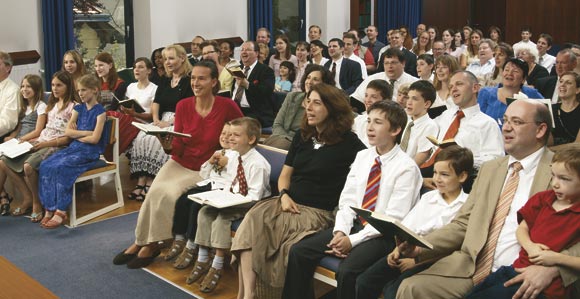Technology can bring people back to church

I was recently reading some articles about why church attendance is generally in decline. One of the main factors cited was that churches are failing to provide for people’s need for community. Interesting. What is a “community” in this age of instant, free, global communication? Geographic proximity is fast becoming irrelevant. Yet churches are nearly invariably organized around a geographic sense of community. Think instead if it was organized around a community of interests, ties of friendship or family, etc.
My perspective is that of an LDS Christian. Picture a typical Sunday. Members from our local area get out of bed, get washed, dressed, travel and arrive to sit and listen to 3 of their fellows (usually a youth, a less experienced speaker, and a more experienced speaker) speak on assigned gospel topics. Each talk might or might not be relevant or interesting to those in attendance, but each speaker takes his or her turn addressing the entire congregation.
Now consider what it would be like to use technology to transcend the limitations of a geographic organization. I can picture excitedly rolling out of bed each Sunday morning to explore that day’s interactive, customizable itinerary. Thousands of members all over the world have indicated their willingness to accept speaking assignments. A few dozen, of varying experience and abilities, have been selected to present talks on assigned topics. I choose from among these, which I am most interested in. I can watch, listen, and/or read these talks. I can avail myself of the latest virtual reality technology if I wish to experience something close to a traditional setting. I can interact with others doing the same thing or choose to participate from more of an arm’s length. I can experience these “talks” in any order and at any time and in any manner I choose. Repeatedly, throughout the day, I have to option to participate in discussions with others on the same subject as the talks. I can see the choices made by my friends and families so I can factor their choices into my own decision about which talks and discussions to join and when.
In this way my church community is now much more relevant to me. It is based on freely chosen associations with friends and family and base on my interests rather than the increasingly irrelevant factor of geography. A global resource pool exposes me to speakers from around the world and to their varying perspectives. This makes me more a part of a worldwide family than an insular community.
Another factor in declining attendance was said to be the “quality of the preaching”. Extracting volunteer speakers from a global pool on varied topics almost assures both quality and relevancy. The quality of the virtual reality experience can provide as much or as little of the traditional feel of going to church as desired. And again, the global resource pool assures that there will be a community of others with whom to share whatever that level of interactivity might be. Physical limitations due to age, infirmity or distance are no longer relevant. People who like to sleep in can do so and still participate when they wish.
Most traditional pastoral care can be offered by members irrespective of distance. Again, with virtual reality increasingly able to simulate the personal touch proximity permits. Certainly there will be some needs where actual physical proximity is necessary but geographic community will not become anathema, but merely relegated to a subordinate role to more relevant bases for community.
As technology inexorably progresses, especially virtual reality, I expect to see all churches evolve along these lines offering greater opportunity for increased and improved participation. I would hope, and expect our church to be at the forefront of progress.